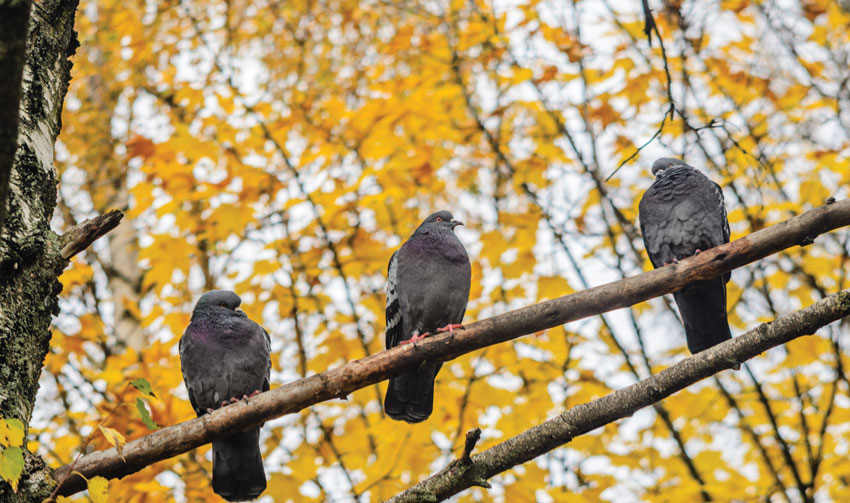Birds of Faith
Enjoying “Good to the Last Drop” Maxwell House Coffee, Mr. Ramesh relaxed on the family-room sofa. From where he sat, about 200 yards away, he could see the Shiva temple and the “Dhwajastambham,” a flagstaff with tiny bells that made a tinkling sound when the breeze tickled them.
There were several Chinese pistachio and Red Maple trees around the main temple. It was fall and the color of the leaves changed daily. When the wind blew, the multicolored leaves flew off twisting and twirling. A few leaves and twigs even reached Ramesh’s backyard, spreading a yellow-red carpet. A gift from Shiva, Ramesh thought.
A flock of birds surrounded the trees. Some for a perch to survey the area, others for a source of food, still others for a discreet tryst with lifelong mates. Rain doves occupied the branches of a tall Red Maple tree keeping a lookout for predators. A swarm of black birds descended on the pistachio trees and while still on the wings plucked and swallowed ripe red berries. Suddenly, for no apparent reason, they flew off creating designs in the sky and settled on other pistachio trees. Ramesh watched them with interest.
Even though the outside scenery was beautiful and enjoyable, Ramesh was unhappy. During an annual health checkup, his doctor picked up abnormal kidney function tests and referred him to Dr. Mobayet, a renal expert. He gently broke the news to Ramesh that he had end stage renal disease and needed dialysis. He advised home peritoneal dialysis.
Ramesh would sit on the sofa and brood. “Why couldn’t I be like those birds, free to fly at will and enjoy the fresh air? Why am I stuck to a machine with its tubes surrounding me like the tentacles of an octopus and spend sleepless nights? At least, right now, these birds are entertaining me. If they migrate to South in winter, I may lose my sanity.”
As the daytime turned shorter and the birds began to migrate, Ramesh lost interest in daily activities. The Indian music he favored, seemed harsh, the eggplant curry tasted awful, and the TV programs he used to love felt tiresome.
Parvathi, Ramesh’s wife, was worried. She spoke with Shankar Sasri, the temple priest, a family friend as well, about her husband.
“What does he do the whole day?” Shankar Sasri asked.
“He sits on the sofa and watches the birds on the temple premises. He is fascinated by them, especially the pigeons and the rain doves. He is worried when they migrate south, he would get depressed. I don’t know what to do.”
“Mrs. Parvathi Amma, have faith in God Shiva, your husband will be all right. Tell him I will do daily Shiva puja in his name.”
As the days passed, the birds consumed most of the pistachio nuts and while the rest fell on the ground for the benefit of the ants and other insects. One evening, hundreds of blackbirds assembled on the bare branches raising a cacophony and suddenly took to the skies. Up and down they flew, and like a huge black cloud driven by wind, floated away south.
It was the middle of January. The trees stood bare like solitary sentinels guarding the temple premises. A few pigeons still roosted in the temple roof in small holes. They fluttered down and pecked at invisible seeds on the ground every morning. All the rain doves had left except for two who remained on one of the lowest branches of the maple tree. Sometimes they faced each other and yet at other times they occupied different branches. There were times when they didn’t show up for a couple of days. Surprisingly, a small number of swallows built their nests at the nooks of the temple entrance, protected from cold and wind and raised their roost. They didn’t migrate.
Ramesh was happy. He felt if the birds could make it, braving the winter, surely, he could do so too against his illness. He realized he was unnecessarily getting agitated. As long as the birds were there, he would be alright.
Two years went by. Shankar Sasri died of a heart attack. As it was customary, Ramesh and his wife visited the priest’s wife, Ganga.
“Your husband, Sasri, was such a nice person. He always encouraged me to think positively,” said Ramesh.
Parvathi said, “Your husband did a miracle; otherwise how could the rain doves and pigeons remain here in the middle of winter?”
Ganga broke down and sobbed. After a few moments she recovered and said, “He was a nice man. Every morning before sunrise, he would open the temple doors, even in the winter, and sprinkle bird seeds on the ground in the back of the temple for the birds. He requested a carpenter to carve two wooden rain doves and placed them on the lowest branches and changed their positions now and then. When I asked him why he was doing all this, he said he was helping a friend. He was such a good man.” Mrs. Ganga couldn’t talk more and sobbed.
“Amma, Ganga. Don’t cry. It is I whom he had helped. He gave me courage and confidence to face my illness. Rest assured that your husband is in heaven, happily resting in the company of God,” Ramesh said.
Many years passed. Ramesh got a kidney transplant. If you’re driving through Richville in San Joaquin Valley, and stop by the Shiva temple at sunrise, you may see an old man sprinkling bird seeds on the temple ground. You may even catch him rearranging two wooden rain doves on a Red Maple tree.


